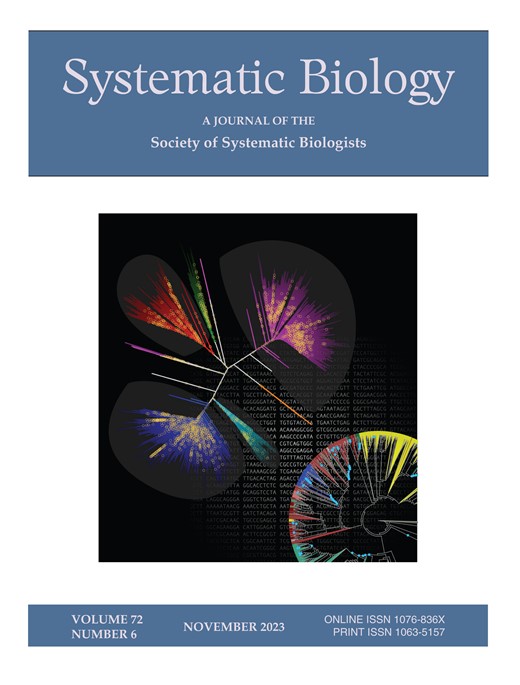Global Patterns of Taxonomic Uncertainty and its Impacts on Biodiversity Research
IF 5.7
1区 生物学
Q1 EVOLUTIONARY BIOLOGY
引用次数: 0
Abstract
Over two million species have been named so far, but many will be invalidated due to redundant descriptions. Undetected invalid species (i.e., synonyms) can impair inferences we make in biodiversity research and hamper the implementation of effective conservation strategies. However, the processes leading to the accumulation of invalid names remain largely unknown. Using multi-model inferences, we investigated the patterns and potential drivers of species- and assemblage-level variation in synonym counts across terrestrial vertebrates globally. We also explored how taxonomic uncertainty (i.e., instability in species identities) can affect latitudinal variation of diversification rates. The average number of synonyms was higher for species described earlier, better represented in scientific collections, with larger geographic ranges, occurring in temperate regions, and in areas of high biodiversity attention. In assemblage-level models, a higher average number of synonyms was associated with temperate regions harbouring more early-described species. Areas of high endemism richness showed fewer synonyms across amphibians and reptiles but had an inverse effect for birds and mammals. Other predictor-response relationships varied across taxonomic groups, biogeographical realm, and spatial grain. Assuming that more synonyms indicate more stable species that have been thoroughly studied and reviewed, high synonym numbers in temperate species and assemblages support claims of a potential latitudinal taxonomy gradient, where geographic variation in taxonomic practice could hinder the proper recognition of tropical species. We show that the accumulation of invalid names is not random and discuss how invalid hidden names can affect biodiversity inferences. A potential approach to address this problem would be developing a taxonomic uncertainty metric that could be incorporated into models (i.e., as weights to account for varying degrees of uncertainty during the fitting process). Our study provides an initial approximation and highlights the often-neglected issue of uncertainty and instability in species identities from a macroecological perspective.全球分类不确定性格局及其对生物多样性研究的影响
到目前为止,已有超过200万个物种被命名,但许多物种将因描述冗余而无效。未被发现的无效物种(即同义词)会影响我们在生物多样性研究中的推论,阻碍有效保护策略的实施。然而,导致无效名称积累的过程在很大程度上仍然未知。利用多模型推断,我们研究了全球陆地脊椎动物物种和组合水平上同义词数量变化的模式和潜在驱动因素。我们还探讨了分类学上的不确定性(即物种身份的不稳定性)如何影响多样化率的纬度变化。同义词的平均数量在早期描述的物种中较高,在科学收藏中有更好的代表性,地理范围更大,发生在温带地区和高度关注生物多样性的地区。在组合水平模型中,同义词的平均数量较高与温带地区拥有更多早期描述的物种有关。在地方特有丰富度高的地区,两栖类和爬行类的同义词较少,而鸟类和哺乳动物的同义词则相反。其他预测-响应关系在不同的分类类群、生物地理领域和空间颗粒中有所不同。假设更多的近义词表明更稳定的物种已经被彻底研究和审查,温带物种和组合中的高近义词数量支持了潜在的纬度分类梯度的主张,在那里,分类学实践中的地理差异可能阻碍对热带物种的适当识别。我们证明了无效名称的积累不是随机的,并讨论了无效隐藏名称如何影响生物多样性推断。解决这一问题的一种潜在方法是开发一种可纳入模型的分类不确定性度量(即,作为权重来考虑拟合过程中不同程度的不确定性)。我们的研究提供了一个初步的近似,并从宏观生态学的角度强调了物种身份的不确定性和不稳定性这一经常被忽视的问题。
本文章由计算机程序翻译,如有差异,请以英文原文为准。
求助全文
约1分钟内获得全文
求助全文
来源期刊

Systematic Biology
生物-进化生物学
CiteScore
13.00
自引率
7.70%
发文量
70
审稿时长
6-12 weeks
期刊介绍:
Systematic Biology is the bimonthly journal of the Society of Systematic Biologists. Papers for the journal are original contributions to the theory, principles, and methods of systematics as well as phylogeny, evolution, morphology, biogeography, paleontology, genetics, and the classification of all living things. A Points of View section offers a forum for discussion, while book reviews and announcements of general interest are also featured.
 求助内容:
求助内容: 应助结果提醒方式:
应助结果提醒方式:


